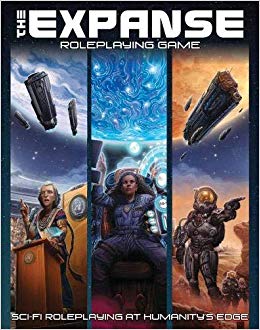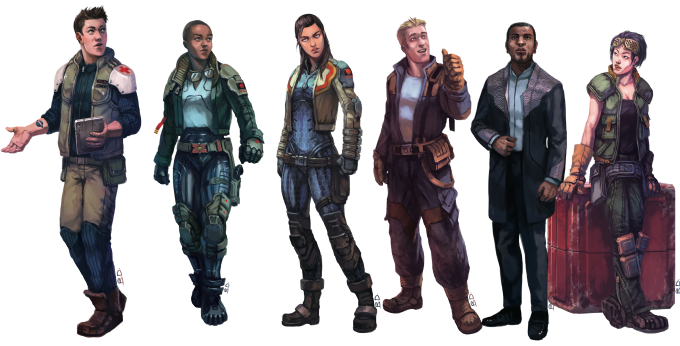

Last night (as of the time of writing this article anyway) saw the release of the PDF of The Expanse RPG to the Kickstarter backers. Like many of you, as soon as I got the email I downloaded my copy and immediately began devouring it. If you recall, some months ago Green Ronin launched their highly successful Kickstarter for the funding of this game. 5,714 gamers raised a total of $402,832 to make this book a reality. And that reality was on full display on my computer screen last night as I devoured the book.
As I alluded to when I wrote about the Kickstarter, the game runs on the Green Ronin’s Adventure Game Engine (AGE), sharing many traits that were developed with the most recent release of the Modern AGE Core Rulebook. Gone are the idea of classes – instead you fully realize your character through talent and focus selection as you increase in level. But The Expanse RPG went even further and tweaked a number of things from the new Modern AGE rules to model The Expanse even better.
Fortune
Simply put, I am in love with this alternative to hit points. It’s fast, easy to adjudicate, and cinematic as hell. Instead of a pool of health points, your character (and more important NPCs) have a pool of Fortune Points that increases as they grow in level. These aren’t your traditional hit points either. You get to choose to spend them, and you can choose to spend them one of two ways – modifying your dice rolls or reducing damage. You can spend up to 6 points of Fortune to change a single die in your roll (and only one die in that roll) into that number. Changing the Drama Die costs double. For example – you roll a 1, 3, and a 3 on the Drama Die for a total of 7. You know you need at least a 10, so you spend 4 points of Fortune to turn that 1 into a 4, turning your failure into a success (that generates stunt points to boot!). If that 1 would have been rolled on the Drama Die, it would have instead cost 8 Fortune Points to get the same result.
But that’s not the only way you can spend Fortune. You can also use it, similar to traditional hit points in order to reduce incoming damage you take from a successful attack, potentially saving you from taking injuries. If, after reducing the damage by your Toughness, there is still damage left over, you can spend Fortune to further reduce damage at a 1:1 ratio. If you reduce damage to 0 this way, you turn the successful attack into a glancing blow or a superficial injury.
If, however, you don’t have enough Fortune Points to reduce the damage to 0, you have several options to avoid being taken out of the fight – you can take the “Injured” condition (which causes you to take a penalty to your tests as well as giving you the “Fatigued” condition), in order to reduce that remaining damage by a 1d6 roll. If there is still damage remaining after that, you can choose to take the “Wounded” condition (a worsening of the Injured condition) to remove a further 1d6 points of damage. If, after all that, you still have even a single point of damage that hasn’t been mitigated, you are taken out of the fight. The PCs may be the Big Damn Heroes, but at the end of the day they are still only human, and being shot or stabbed is a brutal thing. Minor characters that don’t have a pool of Fortune Points can only take the Injured or Wounded conditions to try to stay in the fight.
Rolling Over
Here’s the thing about being taken out of combat – the attacker gets to decide what condition the target is left in. That means they can leave the character merely unconscious, or they can shoot to kill. Rolling over lets the character take themselves out of the fight on their terms when (not if) they find themselves in over their heads and outmatched.

Origin
Similar to Modern AGE in which you choose a Background, Profession, and Drive to help create your character and give him or her access to their starting abilities, you also get to choose your character’s Origin. This decision comes from the setting, letting your character be an Earther, a Martian, or a Belter. This generally has little mechanical impact on your character, but with the constant friction between the three groups it can determine much about how your character perceives the universe, their place in it, and other people in the campaign world.
Interludes
This is an idea that is very similar in its aim to downtime as presented in Dungeons and Dragons 5th Edition. During breaks in the action, the characters are able to pursue other goals, such as recovering from injuries and wounds, maintaining their gear, or forming connections and relationships with other characters, among other things. Instead of playing out a 3 week long trip in space, the GM can simply ask the characters how they wish to spend their time, make any necessary tests, record the results, quickly touch on any important scenes that may come of it, and then move right into the next action scene (an encounter always follows an Interlude).
Spaceships
Space travel is a huge part of The Expanse, and this book doesn’t disappoint in that regard. The book details numerous classes of spaceship from the simple one-man shuttle to the dangerous battleship and everything in between, discussing armament, qualities and flaws that ships may have, and breaking down starship combat in a system that covers all the minutiae of such combat, from commander actions to electronic warfare, and damage control. It’s a little bit more involved than personal scale combat, but not by much, and strives to give each character something to do aboard the ship. Instead of taking injuries and wounds, spaceships take losses, affecting their systems, stability, and crew. I won’t go into too much detail for sake of space, but if you’re a fan of how starship combat is presented in The Expanse, you’ll find a lot to love about this system.
Add into this book lots of history of the universe and how things got to be as they are in the first book as well as a gorgeous rendering of what the Solar System looks like (done by d20 Radio’s own Christopher West no less), profiles of many of the major players in the first few books, and a full introductory adventure, there is a lot to love about this book. I imagine it’s going to make a lot of gamers very, very happy. If you missed out on the Kickstarter, you’re definitely going to want to get in on this game as soon as you’re able.
